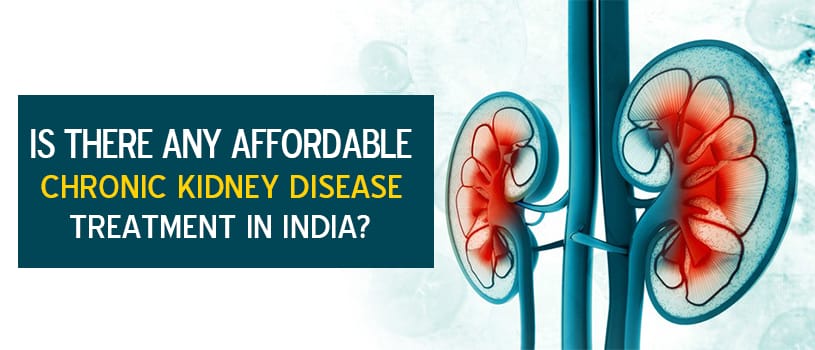Yes, Ayurveda offers a plethora of natural treatments that involve a strong association of a well-balanced diet, regular exercise, and ayurvedic treatment. According to Ayurveda, there are several potent herbs like turmeric, cloves of garlic, black pepper, and red bell pepper that you may find easily at nearby grocery stores or inside your kitchen. Apart from being a soul ingredient of every Indian cuisine, these are also used as medicinal herbs used as natural healers in many parts of India.
When it comes to Chronic kidney disease, luckily, there are certain herbs that can help you to crack it. But, to understand to find the solution to this chronic renal ailment, we need to first pull some strings out of this problem to know what exactly CKD means, what are its symptoms, causes, and why this problem is a call of concern. We will also talk about ayurvedic treatment and its effectiveness to understand its functioning.
What is chronic kidney disease?
Chronic kidney problem is a progressive renal dysfunction, which is also termed as the lasting damage to the kidneys. This is a serious renal problem that can easily go unnoticed at the early stage and only charges your body when it gets severe and hard to control with routine medications. CKD occurs when your kidneys completely stop working as they should, and you might need to undergo a kidney transplant or dialysis to live. Also, there are chances of complications to wave after a kidney transplant, and you might lose your new kidney again. Dialysis is also not a safe procedure as it’s more severe side effects, which can also be life-threatening.
What are the symptoms of chronic kidney disease?
Chronic renal failure is a progressive health ailment and gets severe gradually with time. It doesn’t show up with an apparent sign or symptom at an early stage; that’s why it gets easily unnoticed. However; you may experience some symptoms in few months after getting afflicted by CKD, which may include the following-
- Itchy and dry skin
- Loss of appetite
- Blood in urine
- Swollen legs, arms, and ankles due to fluid retention
- Severe muscle cramps
- Sharp pain at your back and between the ribs
- Nausea and feeling of throwing up
- Having problem in catching breathe
- Anxiety and depression
It’s worth consulting a doctor if you experience more than one of the following symptoms in you or someone you know. Kidney problems can be controlled and eliminated if diagnosed in time and treated with the right medication. If left untreated can impair your kidneys’ functioning, which can be life-threatening.
What are the causes of chronic kidney disease?
Kidney conditions can be a result of more than one condition ranging from biological to circumstantial. Here we have listed some conditions that can cause damage to your kidneys gradually without showing up micro symptoms-
- If you have type 1 or type 2 diabetes
- If you have had polycystic kidney disease
- If you underwent kidney surgery that results in CKD
- If you have had kidney stones
- Obstruction in the urinary tract
- Kidney shrinkage interfere with your kidneys functioning
- High blood pressure
- Deferred kidney structure by birth
Why kidney failure is a call of concern?
Kidney failure can also lead to death if not treated in time. A person might also need to undergo dialysis, which can give some severe side effects to your body. A person might need to undergo major fixes and modifications in his / her lifestyle, like replacing high sodium, spicy and deep-fried foods with a boiled and low or no salt diet. Eating anything that can induce extra pressure on your kidneys can make your problem go from bad to worse.
It’s undeniably important to preserve the health of your kidneys by eating right and regular exercise because apart from purifying your blood, there are other pertinent jobs that your kidneys do to keep you alive, which include:
- Your kidneys keep the level of phosphorus, potassium, protein, calcium, and other fluids in a proportionate amount.
- Your kidneys produce certain hormones that regulate your blood pressure.
- Your kidneys regulate the production of red blood cells in your body.
- Your kidneys produce an active form of vitamin D, which keeps your bones strong and healthy.
How can Ayurveda prevent chronic kidney problems?
Unlike other medications, ayurvedic remedies work on the upper layer of the problem; instead, it works on the ground cause of the problem and delivers permanent relief. Ayurvedic herbs are intended to provide 360-degree relief by eliminating the primary drivers of the problem and help you to attain overall holistic health. The chronicles of Ayurveda have also talked about the primary doshas of the human body (Vata, Pitta, and Kapha), which control certain areas and functions of the human body. The disruption caused in any of the three doshas can affect your kidneys and ayurvedic treatment functions to bring balance to the disrupted dosha and reverse your kidneys’ functioning.
Ayurvedic treatment involves a strong association of a well-balanced diet, regular exercise, and the natural treatment that suppresses the root cause of the problem and gives permanent relief.

